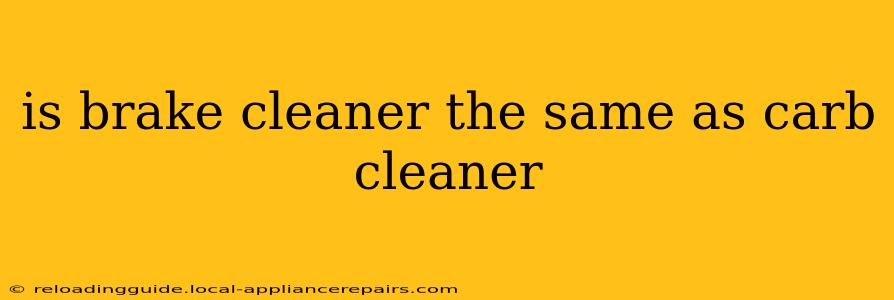Many car enthusiasts, especially those tackling DIY projects, often wonder if brake cleaner and carburetor cleaner are interchangeable. While both are solvents designed to dissolve grime and deposits, significant differences exist in their composition, application, and safety protocols. This article will clarify these distinctions to help you make informed choices for your automotive maintenance tasks.
Understanding the Key Differences: Brake Cleaner vs. Carb Cleaner
The core difference lies in their formulations and intended use. Brake cleaner is formulated to rapidly evaporate, leaving behind minimal residue. This is crucial for brake system maintenance as any lingering solvent could compromise braking performance. Carb cleaner, on the other hand, often contains more aggressive solvents designed to dissolve stubborn varnish and deposits commonly found in carburetors. Its evaporation rate is generally slower.
Chemical Composition: A Closer Look
Brake cleaners typically utilize chlorinated solvents or blends of hydrocarbons with rapid evaporation characteristics. These formulations are effective at removing grease, oil, and brake dust from brake components. Carb cleaners, in contrast, frequently include stronger solvents like ketones or esters, alongside additives designed to emulsify and lift heavy deposits. These stronger solvents are necessary to clean the intricate passages within a carburetor.
Application and Safety Considerations: Key Distinctions
Brake Cleaner:
- Application: Primarily used for cleaning brake components, calipers, rotors, and drums. Its rapid evaporation prevents contamination of brake pads and ensures quick drying.
- Safety: While generally less aggressive than carb cleaner, it’s still highly flammable and should be used in well-ventilated areas. Direct skin contact should be avoided, and eye protection is essential. Always refer to the specific product's safety data sheet (SDS) for detailed instructions.
Carb Cleaner:
- Application: Used for cleaning carburetors, fuel injectors, and other fuel system components. Its ability to dissolve stubborn deposits makes it effective in tackling varnish and gum buildup.
- Safety: Carb cleaner is typically more aggressive and flammable than brake cleaner. It's crucial to follow safety precautions meticulously, including wearing appropriate personal protective equipment (PPE) such as gloves, eye protection, and a respirator. Work in a well-ventilated area away from ignition sources. Always check the product label for specific safety information.
Environmental Impact: A Factor to Consider
Both brake cleaner and carb cleaner contribute to air pollution when used improperly. The solvents released during application can harm the environment, so it’s vital to use them responsibly and in well-ventilated areas to minimize airborne emissions. Consider the environmental impact when choosing a product and dispose of any leftover cleaner according to local regulations.
Choosing the Right Cleaner for the Job
The choice between brake cleaner and carb cleaner depends entirely on the specific cleaning task. Using the wrong cleaner can lead to suboptimal results or even damage to components. Always select the cleaner specifically designed for the intended purpose. Using brake cleaner on a carburetor might not effectively remove stubborn deposits, while using carb cleaner on brake components could leave behind harmful residues.
Conclusion: Understanding is Key
While both brake cleaner and carb cleaner are solvents used to remove grime and deposits, their compositions and intended uses differ significantly. Understanding these distinctions is crucial for maintaining your vehicle safely and effectively. Always prioritize safety by wearing appropriate PPE and working in a well-ventilated area. Remember to consult the product's safety data sheet (SDS) for comprehensive instructions and safety information.

